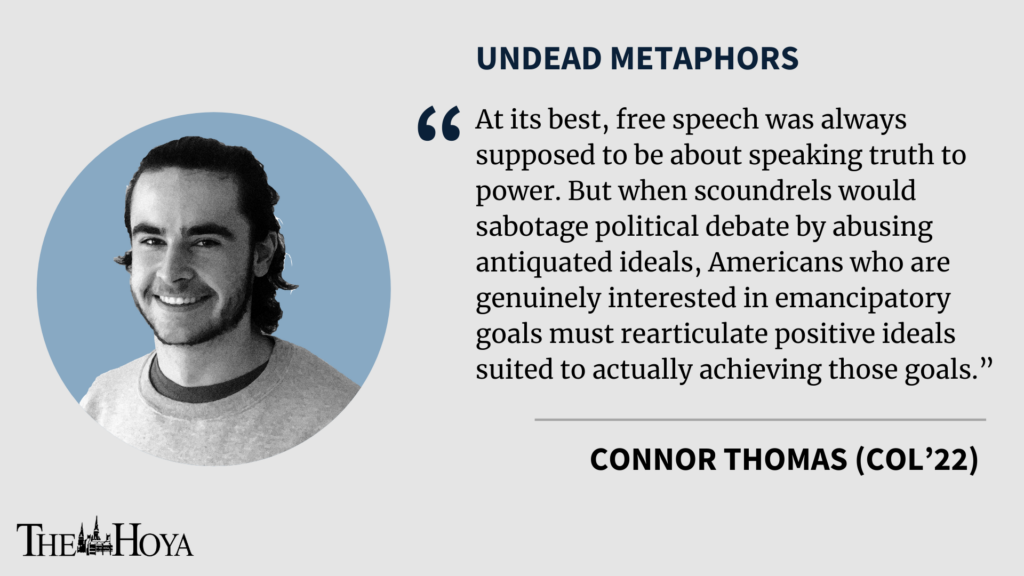We have all developed new coping mechanisms during the COVID-19 pandemic, myself included. In my case, on a particularly stressful day in early January, I booted up “Call of Duty: WWII Nazi Zombies” for the first time in a while. They do say life imitates art. As we all process and unpack the Jan. 6 Capitol insurrection, I have found zombie horror to be very of the moment.
Zombies mill about our current political landscape. These rhetorical zombies parrot so-called talking points that hamper more than they help in producing positive reform. Staying on guard against rhetorical zombies is vital, because it can be hard to resist talking without saying anything productive. However, there are ways to recognize and fight these creatures.
First, let’s look at an example of rhetorical zombies in the wild.
In one sense, we all bear the task of the zombie: deciphering who has the brains. And on Jan. 6, it was much easier than usual to tell that the rioters at the capitol were on the hunt for the brains they evidently lacked.
The insurrection provoked myriad responses of varying intensities from across the political spectrum. But one thing that remained consistent through it all was how those involved in encouraging or carrying out the insurrection defended themselves from criticism.
When faced with such criticism, far-right extremists repeat the same thing without even thinking: “free speech!” Unfortunately, part of the reason far-right extremism has become so widespread in the United States is because of the manipulation of this ostensibly noble liberal ideal.
George Orwell, someone ironically gaining currency with the far-right, provides insight into how political actors can debase ideas. In his utterly necessary essay, “Politics and the English Language,” Orwell outlines rules for good communication, which include avoiding “dying metaphors.” He writes, “A newly invented metaphor assists thought by evoking a visual image,” whereas a dead metaphor has been overused and has lost its ability to evoke anything at all.
Orwell’s concept of the dead metaphor nearly, but not exactly, describes what has happened to free speech in the United States. It is not that free speech has lost all its evocative power. Instead, quite the opposite has happened. Free speech has more power than ever to shut down criticism.
Former President Donald Trump appealed to free speech, among other noble ideals, while trying to shirk responsibility for allegedly inciting the insurrection at the Capitol. “I also want to say a few words about the unprecedented assault on free speech we have seen in recent days,” he said in a video message released from the White House on Jan. 13, incensed after social media companies banned him and others for violating their policies.
Sen. Ted Cruz (R-Texas) also cries “free speech!” with malicious intent. He decries what he sees as bias against conservative views on mainstream social media platforms, even as he votes to overturn certified election results and calls to white supremacists and xenophobes with dog whistles.
Trump, Cruz and even the recently reprimanded Rep. Marjorie Taylor Greene (R-Ga.) smuggle in a trace of unfreedom behind freedom of expression. When our leaders misuse free speech to defend hateful politics and policies, the country suffers. Free speech, a foundational democratic ideal, has been debased by upholding unfreedom.
Enter the clarifying power of the zombie horror genre. What actually makes zombies scary is undecidability. That is, these creatures defy the life/death binary. Without anything to oppose them, they are “undead.” Free speech has become just as undecidable, an undead metaphor.
Rejecting free speech altogether will not fix the problem, though. Instead, a positive ideal must be affirmed over and above free speech — something that reorients it toward justice. This is, after all, what it means for humans to kill the undead, reasserting life over death. We need a fresh idea to breathe new life into our politics.
University of Miami law professor Mary Anne Franks is the life-affirming zombie slayer up to the task. In search of a new free speech paradigm, she proposes a new ideal: “Fearless Speech.” By resurrecting the old Greek idea of parrhesia — opposed to its fraternal twin isegoria — Franks adds a qualitative dimension to moderating public debate. That is, the more sincere, frank and courageous someone’s speech is, the more protection it deserves. Fearless speech over free speech.
At its best, free speech was always supposed to be about speaking truth to power. But when scoundrels would sabotage political debate by abusing antiquated ideals, Americans who are genuinely interested in emancipatory goals must rearticulate positive ideals suited to actually achieving those goals.
Words can outlive their usefulness, and sometimes we need fresh language to have conversations that lead to action. Join me in the coming weeks as we face together the horde of undead metaphors infecting the United States’ social and political discourse.
Connor Thomas is a junior in the College. Undead Metaphors appears online every other Friday.









